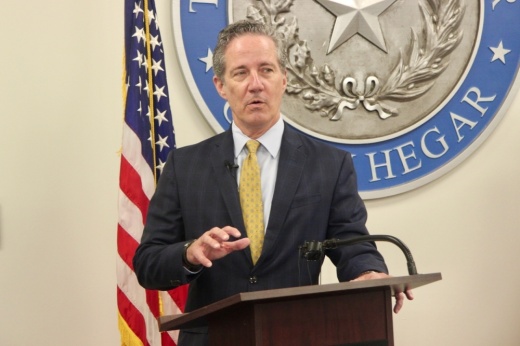At a glance
Odyssey will work with the comptroller to launch the program, deemed “Texas Education Freedom Accounts,” ahead of the 2026-27 school year. Families can begin applying for the program early next year, and those accepted will receive thousands of dollars in state funds to send their children to private school or homeschool them.
In the first year of the program, most participating families will receive about $10,330 per student for private school tuition and other expenses, while homeschool students will receive up to $2,000 annually. Students with disabilities will qualify for up to $30,000 per year.
“We’re moving quickly to launch this program, keeping the end goal in sight every step of the way—giving parents the freedom to choose the best educational path for their children to reach their God-given potential,” acting Comptroller Kelly Hancock said in an Oct. 6 statement. “This is about empowering families, expanding opportunity and making sure every child can learn in the environment that works best for them.”
Hancock is a former state senator and voted to create the education savings account program earlier this year. He became acting comptroller this summer, telling reporters June 19 that launching the new program was a top priority for his office.
“The important thing right now is education savings accounts: freedom for those in the education area to help us improve our education that’s been lagging,” Hancock said at the time. “That is a daunting task set before us, and ... we’re ready for that challenge.”
Texas is set to become at least the 30th state to enact a program that uses public funds for private education, according to previous Community Impact reporting. Proponents of the program, including most Texas Republican lawmakers, have said it will expand educational options for families who may not want to send their children to a public school. Texas Democrats and some public education advocates have expressed concerns that the program will unfairly benefit wealthy families and divert funding from public schools.
Zooming in
Odyssey will develop and manage an online platform to administer Texas’ education savings account program. State law also tasks the company with:
- Collecting applications and determining which families are accepted to the program
- Approving vendors for education-related materials and services, such as textbooks, transportation and tutoring
- Reviewing inquiries and complaints about the program
- Advertising the program and communicating with interested families
Next in line are families with incomes at or below 200% of the FPL, which is about $64,000 for a family of four. Families with incomes between 200%-500% of federal poverty guidelines will be in the third priority tier, followed by all families, regardless of income. Siblings of children enrolled in the program will also be prioritized.
Texas private schools are not required to participate in the education savings account program. Participating schools are not required to accept all students, although they must be accredited and have operated in Texas for at least two years, lawmakers said in April.
More details
Under state law, the comptroller’s office can pay Odyssey up to $50 million, or 5% of the $1 billion in initial program funding, to facilitate the education savings account program.
Odyssey operates similar education savings account programs in Georgia, Iowa, Louisiana, Utah and Wyoming. In an Oct. 6 statement, Odyssey founder and CEO Joseph Connor said he was “thrilled” to be selected to launch Texas’ program.
“Having successfully served hundreds of thousands of students across the nation, we are ready to deliver a user-friendly and trustworthy platform that can ensure a seamless rollout,” Connor said.
Odyssey previously managed Idaho’s education savings account program, and a 2023 state audit found that up to $180,000 in program expenses approved by Odyssey were unauthorized. Idaho later ended its contract with Odyssey and began working with a competing company, ClassWallet, according to the program website.
Texas lawmakers directed the comptroller’s office to select up to five organizations to facilitate the program, although Hancock did not announce additional partnerships Oct. 6. Texas' program will also be audited periodically to ensure all participating families are eligible and do not use state funds for unapproved expenses.





